Remote working in the UK has exploded over the last few years, driven by improvements in workplace technology and boosted by the effects of lockdown restrictions.
But now that the lockdowns are over, what are the facts and figures behind remote working in Britain? How many of us work from home? How many work a hybrid week? And what are the effects on our work, wallets, health, and employers’ businesses?
We’ve pulled together all the latest figures from the ONS and numerous other major publications to bring you the latest remote working statistics for the UK for 2025.
Key UK remote work statistics 2025
- 40% of UK British people work from home at least some of the time (hybrid or full-time remote) in 2025.
- The amount of people working exclusively from home in the UK has decreased by 17% from 2022 to 2025.
- The majority of workers, 58%, would refuse to comply with a return-to-office (RTO) mandate.
- 40% of employers now require staff to work from the office 5 days per week.
- 62% of CEOs believe that everybody will be back to working from the office by 2027.
- 14% of UK workers currently work exclusively from home in 2025.
- 1 in 4 UK workers now work a hybrid work week.
- Only 10% of hybrid workers want to return to a fully remote work model.
- Over half of all UK employers are offering remote work in 2025.
- 78% of remote workers report an improved work-life balance.
- The term “remote jobs” is now searched for over 71,000 times per month in the UK on Google – a 1900% increase over the last 7 years.
How many people are working remotely in the UK in 2025?
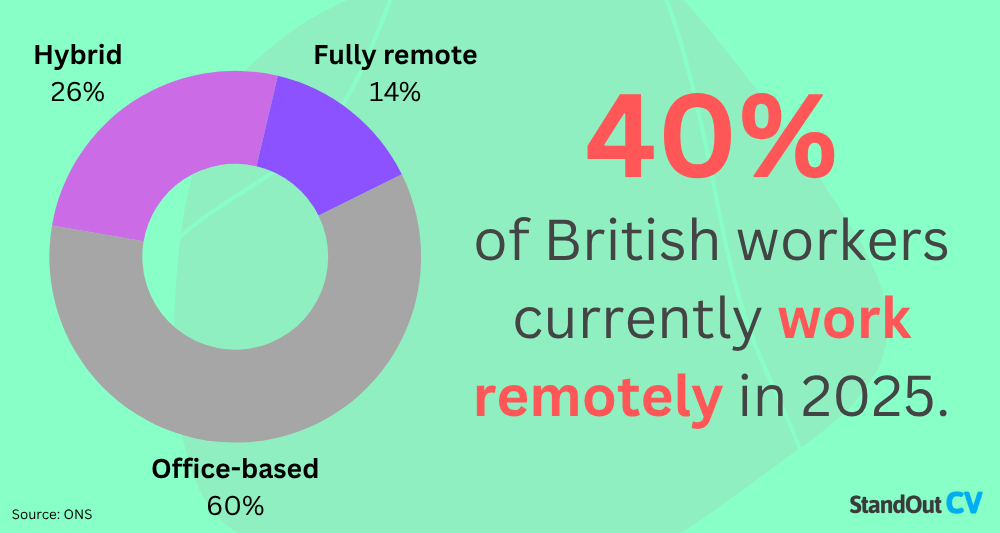

According to the ONS, 40% of UK workers currently work remotely in 2025, which is made up of 14% full-time remote workers, and 26% hybrid workers (who split their time between home and the office).
Although remote working has become increasingly common in the last few years, it has been gradually increasing since the 1980s – it has also decreased significantly since the peak of the Covid-19 restrictions and lockdowns.
In this graph we look at the numbers of people who are working remotely in the UK and how this has changed in recent times.
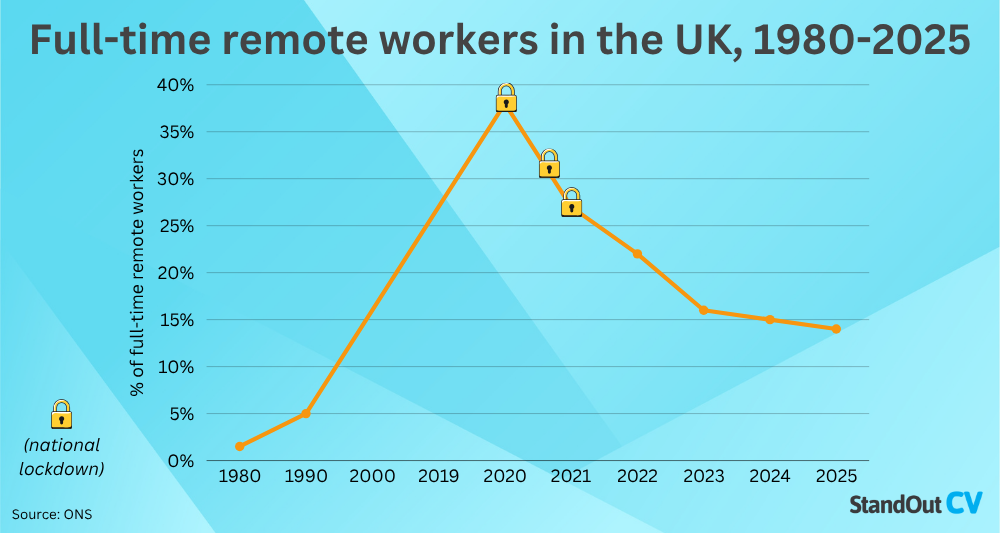

- In 2025, the amount of people working exclusively remotely has dropped by 24% from 2022.
- 77% of employers are offering remote work to all viable staff in 2025.
- In 2025 the amount of people working remotely in the UK was 40% of the workforce – a 17% decrease from 2021.
- The UK is second highest in the world, beaten only by Canada, in remote work rates, according to a paper by WFH Research.
- In 2020, following the first ever national lockdown, 37% of the UK’s working population worked remotely at some point in the year – an increase of 10% from the previous year.
- According to a recent WISERD report only 1.5% of UK workers worked remotely in 1981.
Hybrid working statistics
Hybrid working is the practice of splitting an employees working week between working at home, and visiting the office. Since the end of the Covid-19 lockdowns, this flexible approach to work has grown in popularity, providing a wealth of benefits to staff and businesses.
Here are the numbers behind hybrid working in 2025.
- According to the ONS, 1 in 4 workers now work a hybrid working model.
- Labour Force Survey data shows that 50% of workers are in roles that are unable to work remotely.
- The ONS also found that Tuesday is the most popular day to work from home, with 67% of workers favouring it – followed closely by Friday at 65%.
- 3 days a week in office is the most common hybrid setup – but workers prefer 2.
- 78% of hybrid workers claim they have an improved work-life balance.
- 53% of people who earn over £50,000 work with a hybrid model.
- Only 10% of hybrid workers want to return to a fully remote work model.
Return-to-office (RTO) mandates
Employers have begun to mandate that workers return to the office full-time, and there are fears that this will continue to become a widespread trend. 62% of UK CEOs expect their companies to make a full return to the office by 2027, according to the professional services network KPMG.
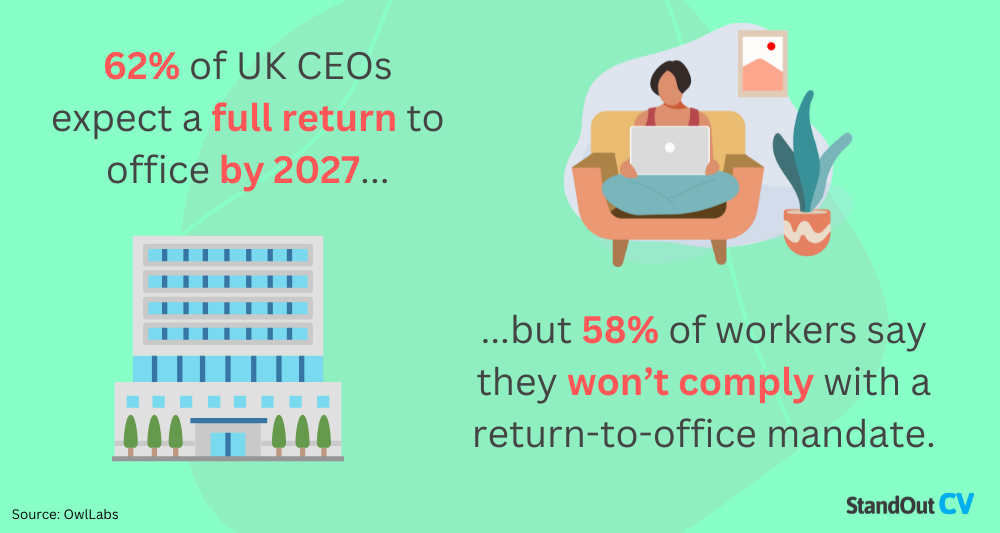

- CBRE found that 80% of organisations have RTO policies, but only 17% are actively enforcing them.
- Savills’ research found that 64% would like to increase RTO mandates, but feel they are unable.
- A survey from King’s College London found that only 42% of workers would comply with the mandate: 58% of these would immediately quit or start looking for work.
- Compliance is even lower among parents; only 1 in 3 parents would accept the end of remote working.
- Women are less likely to comply with RTO mandates – 55% would look for a new job, compared to 43% of men.
Who is working remotely?
Whilst a large number of Brits have worked remotely in recent times, the likelihood of us being able to work remotely depends on many factors including our age, sex, profession, industry and salary.
So, who are the people working remotely, and who are the people who aren’t?
Demographics of remote workers
How does age, sex, location and education affect your chances of being able to work remotely? The ONS breaks it down by various demographics.
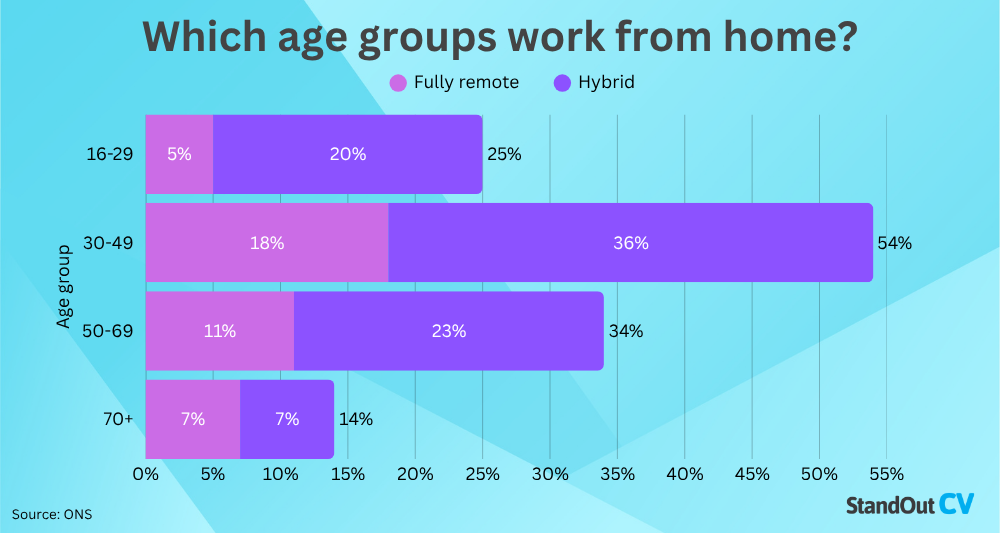

- The 30–49 year-old age group are the most likely to be working remotely, with 54% of them working remotely.
- 70+ year olds are least likely to be working remotely, with only 13% of the group undertaking remote work.
- Londoners are more likely to be remote workers than any other UK region, and people in the West Midlands are least likely to pick up remote work.
- Men are slightly more likely to be working remotely by a margin of just 3%.
- Those with a degree are twice as likely to obtain remote work than non-graduates.
Professions of remote workers
Some jobs can be carried out with just a laptop and internet connection, whereas others simply cannot exist without the physical presence of an employee. This creates a big divide between the types of workers who can work remotely and those who can’t.
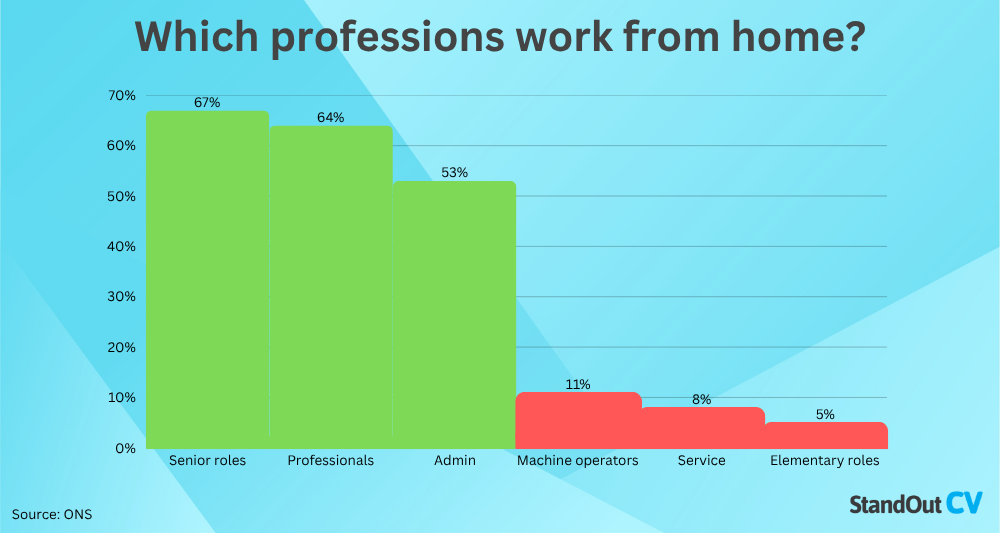

The professions most likely to be able to work remotely are:
- Managers, directors and senior officials – 67%
- Professional occupations (lawyers, accountants etc.) – 64%
- Administrative and secretarial positions – 53%
“Occupations that require higher qualifications are 4 times as likely to offer remote work”
The professions least likely to able to work remotely are:
- Plant and machine operators – 12%
- Carers, leisure workers and other service roles – 8%
- Elementary roles (e.g. sales and customer service) – 15%
“81% of (usually) office-based professionals in the UK are working from home at least once per week”
Industries of remote workers
Some industries rely heavily on the physical presence of their staff, whereas others can function largely through technology and a “virtual presence”.
So, which industries have the most remote staff?
- Those working within IT and communications have the highest chance of working remotely with over 80% working remotely in 2025
- The industries with the lowest percentage of remote workers are
- Accommodation and food services – 8%
- Transportation and storage – 16%
- Health and social work – 18%
Salaries of remote workers
How much money you earn can have a big impact on your likelihood of working remotely. Here we look at the income bands of remote workers.
- Only 29% of those earning less than £20,000 have the option to work remote.
- 80% of those earning over £50,000 are able to work remote.
- The majority of people earning over £20,000 per year are choosing a hybrid working model, splitting their time between home and the office.
Employment status of remote workers
Whether you are a permanent staff member, contractor or freelancer, your employment status has an effect on your chances of finding remote work.
- Permanent employees are least likely to work remotely with 64% of them working remotely.
- Contractors and freelancers are the most likely to work remotely, at 74% and 89%
- Self-employed workers are twice as likely to work from home.
Workers with disabilities
More flexible working patterns have had a positive impact on inclusivity for workers with physical and mental ailments: in fact, 1 in 5 remote workers are disabled, according to research from Lancaster University.
- 80% of disabled remote workers say that working from home has benefitted their health, and 85% consider the option an important consideration when job searching.
- The DWP found that 44% of UK companies offer remote work to those suffering ill health.
- Meanwhile, the CIPD states that 42% of business found they had improved their ability to hire disabled workers since offering remote work.
Who is not working remotely?
Whilst much of the UK population are enjoying the flexibility of remote work, there is a significant portion of people who cannot work remotely.
- Delivery drivers, catering staff, buildings maintenance workers and front-line nursing staff have a 0% chance of working remotely.
- 9% of UK employers do not allow remote work.
Which companies hire remote workers?
Many firms have been actively encouraging remote work throughout the pandemic and continue to do so. But not all employers are so keen to embrace the world of remote working.
- 58% of all UK employers are offering remote work for viable roles in 2025.
- 80% of company directors and leaders have allowed some form of remote work from 2020 onward.
- Globally, 16% of employers are operating on a fully remote basis, with no office or physical workspaces at all.
Do employers want staff to return to the office?
- A recent KPMG survey of UK CEOs found that 62% believe that everybody will be back to working from the office by 2027.
- Meanwhile, 87% of CEOs said they were more likely to give “favourable assignments, raises, or promotions” to employees who came into the office than to those who worked remotely.
- 25% of companies have no hybrid working model in place.
- JLL’s global survey found that 44% of organisations want to see the return to 5 days in the office.
Do people want remote work?
Remote work may have been increasing in recent years, but do staff actually want to work from home?
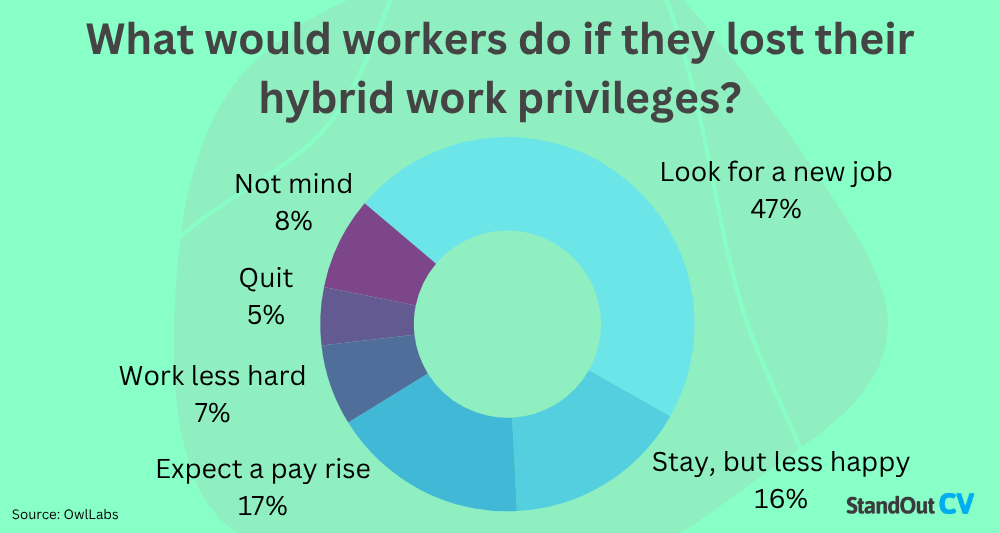

- According to the CIPD, 53% of people consider remote working key when applying for a job – second only to pay at 77%.
- 30% of workers would sacrifice 10% of their salary for a fully remote work location.
- 43% would reject a job offer if it required office work full-time, according to a survey from OwlLabs.
- Only 37% of UK workers say they never want to work from home.
- 20% of people are considering moving further away from their workplace due to work-from-home options available to them.
- 60% of working people believe that a hybrid model of working partly remotely and partly in the office, will be the most beneficial for them.
The term “remote jobs” is now searched for over 71,000 times per month in the UK on Google – this has increased 1900% over the last 7 years. The below Google Trends graph shows the level of interest in the search term “remote jobs”. Values closer to 100 represent peak popularity – the graph demonstrates how interest has increased massively since before the Covid pandemic.
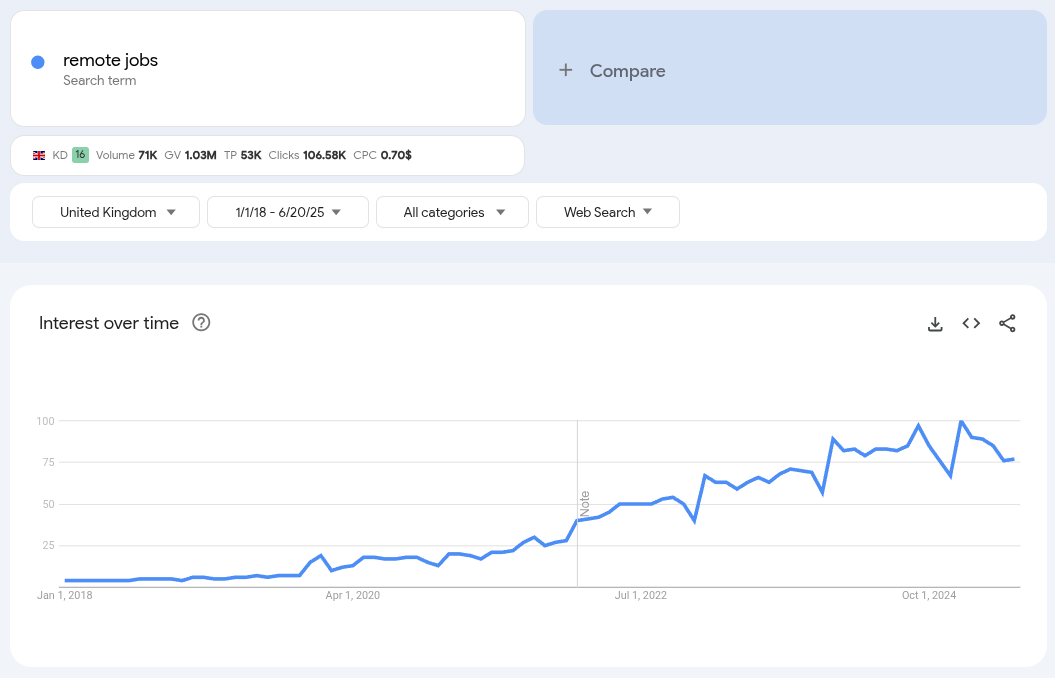
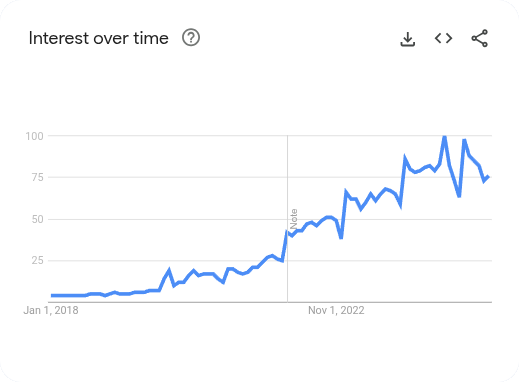
Benefits of remote working
Remote working can offer a huge range of benefits from time saved on commuting and office-leasing, to reducing pollution and boosting productivity.
Here is a deeper look into the numbers behind these claims.
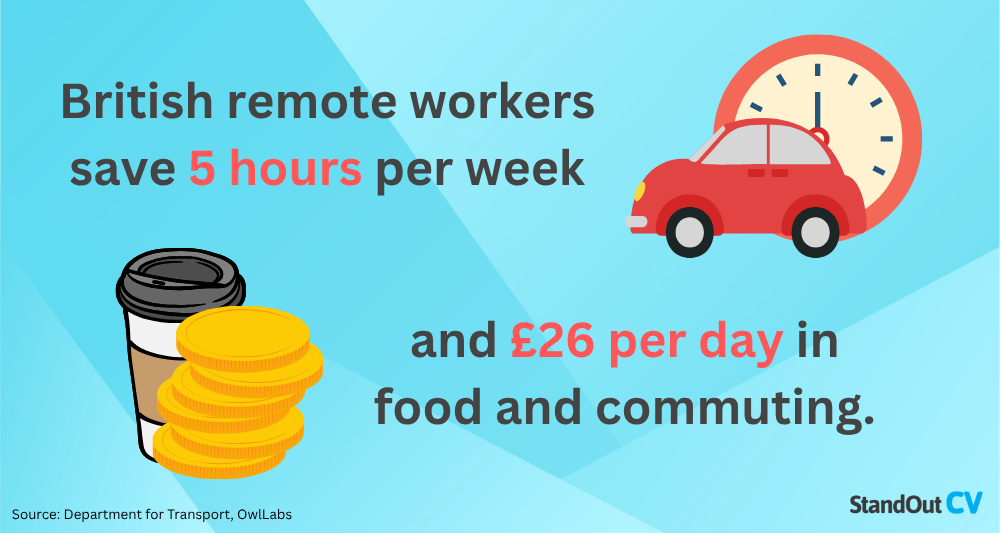

Time
How much time are we getting back through remote work?
- The average British worker saves 5 hours per week by cutting out their commute – totalling 240 hours per year, according to the Department for Transport.
- Remote or hybrid workers are 4 times more likely to get a face-to-face GP appointment within one week – due to the ability to attend during standard working hours.
- 44% of workers have been able change their work pattern to benefit them.
More studies:
Average salary UK | Resume statistics USA
Money
How much money are we saving through remote work?
- The average remote working Brit is saving a total of £26 per day (or £130 per week) by cutting out commuting and lunch costs, according to findings by OwlLabs.
- UK businesses with a part-remote work force are saving 45% on office cleaning services, 36% on catering, and 36% on rent and utilities.
- More than one in five companies claim that remote work has reduced their staff absentee rate, reducing their sick-pay spend.
- A Capgemini report suggests that having a mostly-remote work force can slash operational costs by a third.
- London businesses could save an average of £75,312 per year if just 20% of their staff worked remotely.
- The IWG found that 79% of businesses report cost savings from offering remote work, while 75% say it helps ease upcoming economic pressures.
- Research from tech company Lemon.io calculates that companies could save £8,000 per year for each worker they make remote.
Productivity
Although many employers will worry about their staff’s work efforts whilst working out-of-sight, many employees and companies report boosts in productivity.
- The CIPD found that 38% of organisations say remote working has improved productivity.
- 75% of workers say that they are more productive when working at home, because of the lack of distractions from colleagues.
- 75% of UK CEOs have observed improved productivity, found a survey from IWG.
- 58% of employees say that working remotely gives them more autonomy.
- 55% of people claim that they can concentrate better when working at home.
- Three major studies (JD Edwards, American Express, and Compaq) found that remote workers are between 15% – 45% more productive than their office counterparts.
- According to research from the IWG, 76% of companies improved staff retention by offering flexible working patterns.
- Research from Stanford concluded that hybrid employees are just as productive, likely to get promoted, and far less prone to quit than office colleagues.
Mental health & well-being
In addition to financial and time savings, some employees also claim that remote work is improving their well-being.
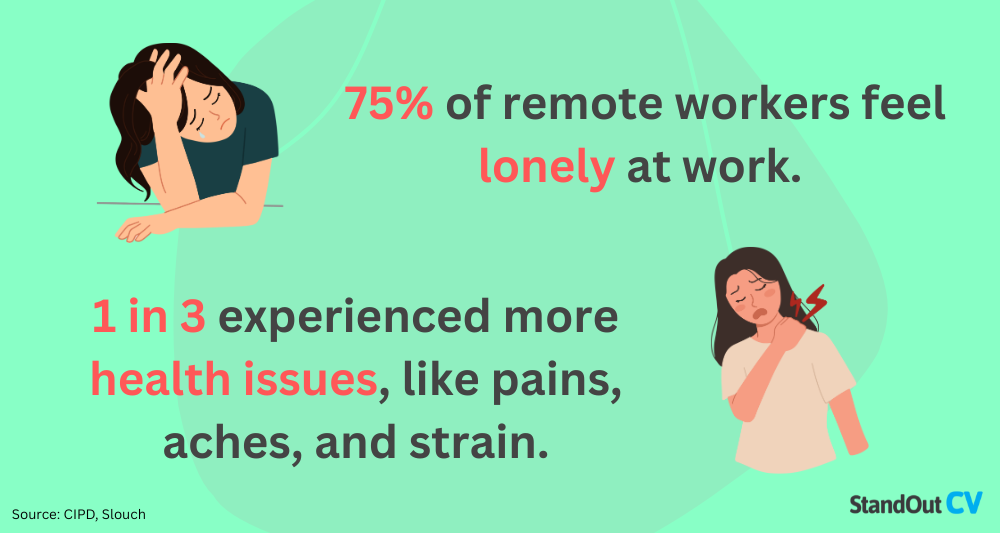

- More than half of employees claim to be happier and have greater job satisfaction when working remotely.
- 33% of remote workers have been able to dedicate more time to their hobbies, interests and family.
- OwlLabs’ study found that 6 in 10 remote workers do some physical activity during the day.
- The study also found that 80% of employees eat healthier when they’re working from home.
- Remote workers report that cutting out their commute was the biggest benefit to their mental health.
Environment
Outside of our own work and life, many reports claim that remote work provides a host of benefits to the environment.
- During the first national lockdown CO2 emissions reduced by 25% across the country.
- If every office-based worker in the UK worked remotely 50% of the time, it would stop the production of 54 million tonnes of greenhouse gas, the equivalent of taking 10 million cars off the road.
- Due to reduced consumption of single-use plastics, remote workers will use less than half the amount of plastic as office-based staff.
- KPMG also found that remote workers produce 29% lower individual emissions than office workers, due to their ability to switch of lights and heating whilst at home.
Negative effects of remote working
Working from home isn’t always a positive experience for everyone.
Here we look at some of the more commonly reported negative effects of remote work.
Mental health & well-being (negative)
Whilst some employees report positive benefits on their mental health, wellbeing seems to be the area with the largest negative impact in remote work.
- 26% of remote workers cite a negative impact on their mental health.
- 67% of workers say that they feel less connected to their colleagues when working from home.
- The CIPD found that 75% of home workers are more likely to say they feel lonely at work.
- 25% of Brits are working from a bedroom or sofa, and half of those people have developed musco-skeletal problems .
- Office furniture manufacturer Slouch found that 32% of remote workers have noticed an increase in physical health issues, for example aches and pains.
- 34% of Brits working at home say that it has placed a strain on relationships with partners and children.
- Kahoot surveyed over 2,000 hybrid UK professionals and found that 55% suffer from ‘video call fatigue’, while 28% are less tolerant of video calls being crashed by children or pets than they were a year ago.
- 11% of people admitted that working from home has increased their alcohol consumption.
Work-life balance (negative)
Creating a clear divide between work and home-life is another key issue for remote staff when trying to find a good work life balance.
- 22% of people find it hard to switch off after finishing a day of working a home.
- 35% of home workers feel they have to be at their computer all day in order to respond quickly.
- 3 in 10 Brits find it hard to separate their home lives from their work lives.
- 31% of workers feel they have to be twice as productive when working remotely.
- More than half of remote workers feel they are working longer and taking less breaks.
- One third of workers feel they will be overlooked for promotion if they have been working remotely.
- 36% of people think that it’s harder to make an impact when working from home.
- The CIPD found that 4 in 10 hybrid working women feel excluded from the workplace, while 39% of employers are concerned about inclusion risks.
- Forbes found that 72% of remote workers are less likely to take sick days.
- 34% of remote workers have completed administrative work outside of work hours, while 23% have taken their work device on holiday.
Difficulty for employers
The professional body for HR workers, CIPD, has also identified a number of difficulties which might affect employers who offer remote work.
- 41% of managers struggle to manage remote teams as effectively as those in an office.
- 1 in 4 managers have noticed a negative impact on company culture, as remote workers don’t forge as strong relationships.
- 33% experience technical difficulties with the new software required for remote work.
Where do remote workers work?
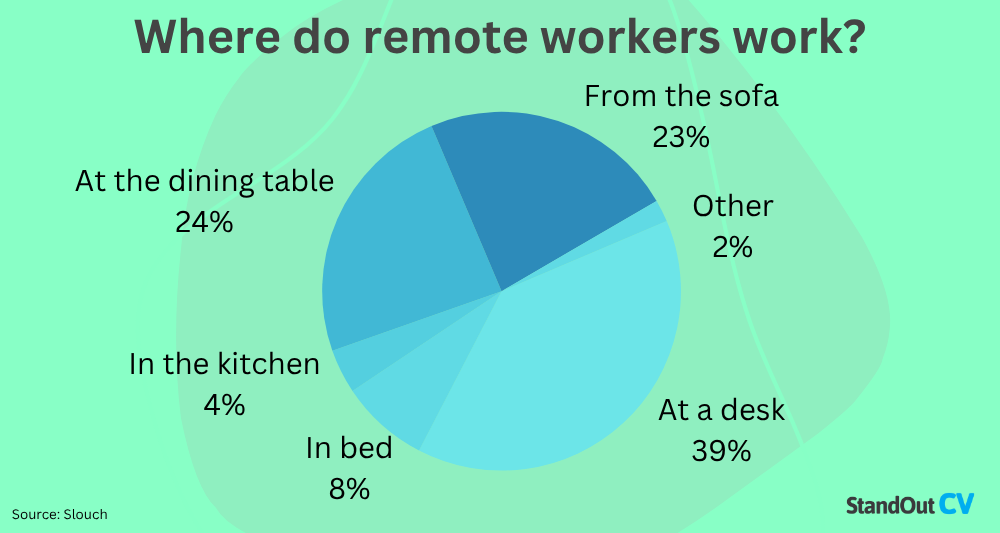

Not all remote workers work from home, and those who do may work from different areas of their home. According to Slouch, 39% of remote workers do so from a desk, 24% from the dining table, 23% do so from a sofa, and 8% work from their bed. RSPH found that 11% have a dedicated office room to work from.
55% work from somewhere other than their home or a coworking space, such as a cafe, according to a 2024 study from OwlLabs.
7 in 10 home workers feel that they lack the right equipment to carry out their job, with 38% of people claiming they miss having a printer the most.
Coworking spaces
The growing prevalence of remote work has given rise to a new industry: coworking spaces, a low-cost, shared office space for remote workers of different companies.
- CoworkingCafe’s 2025 report found that the UK is already home to 3,829 coworking spaces.
What tools do remote workers use?
Remote working requires the use of new, specialist tools and software. 17.5% of remote workers use some kind of time tracking software to help productivity, finds a survey from Agility EOR.
- The most popular software remains Zoom, which 17.4% of remote workers use.
- 12.1% use GitHub, and 8.1% make use of Google Workspace.
- OwlLabs determined that 21% of remote workers use AI tools daily.
Searching and recruiting for remote jobs
Online job adverts for remote work have increased by 307% since the first national lockdown, while Indeed states that 14.6% of job postings mention remote work.
And the option of remote work has become an almost essential benefit for employers to offer, with 64% of recruiters saying that being able to pitch a work-from-home policy to candidates helps them find high-quality talent.
Future of remote work
It doesn’t look like remote work is going anywhere fast according to these numbers.
- According to the IWG, 74% of UK CEOs say that a full-time return to office is not a priority.
- 28% of British workers would like to work from home permanently in the future.
- 44% of Brits would like to adopt a hybrid model of working, splitting their time between home and the office.
- 87% of UK businesses have adapted to hybrid working.
- 85% of managers believe that having remote workers will become the new normal for many teams.
- In 2021 HSBC offloaded 40% of its office space globally; Lloyds Banking Group shed 20% of theirs.
More regions: Remote work statistics Australia
Sources
Wales Institute of Social and Economic Research and Data | Remote work study: https://wiserd.ac.uk/sites/default/files/documents/Homeworking
Office for National Statistics | Coronavirus & home working 2019: https://www.ons.gov.uk/employmentandlabourmarket/peopleinwork/employmentandemployeetypes/articles/coronavirusandhomeworkingintheuklabourmarket/2019
Office for National Statistics | Coronavirus & home working 2020: https://www.ons.gov.uk/employmentandlabourmarket/peopleinwork/employmentandemployeetypes/bulletins/coronavirusandhomeworkingintheuk/april2020
Office for National Statistics | Business and individual attitudes towards the future of homeworking: https://www.ons.gov.uk/employmentandlabourmarket/peopleinwork/employmentandemployeetypes/articles/businessandindividualattitudestowardsthefutureofhomeworkinguk/apriltomay2021
YouGov | Work from home survey UK: https://yougov.co.uk/topics/economy/articles-reports/2021/04/13/one-five-want-work-home-full-time-after-pandemic
Owl Labs | State of Hybrid Work 2024: https://owllabs.co.uk/state-of-hybrid-work/2024
Hitachi Capital | Small business remote work costs: https://www.hitachicapital.co.uk/business-finance/invoice-finance/invoice-finance-blog/sme-business-cost-savings-from-remote-working/
Consultancy.eu | Remote operating cost: https://www.consultancy.eu/news/5523/remote-working-can-slash-operational-costs-by-one-third
PowWowNow | Realities of remote working: https://powwownow.co.uk/smarter-working/guide-managing-remote-workers/
Google Trends | Remote jobs: https://trends.google.com/trends/explore?date=today%205-y&geo=GB&q=remote%20jobs
Hoxby| Covid 19 Remote working survey: https://hoxby.com/blog/covid-19-remote-working-survey-results
Global workplace analytics | Cost benefits of remote working: https://globalworkplaceanalytics.com/resources/costs-benefits
Porch | Home habits: https://porch.com/advice/healthy-habits-at-home
Zoho | Environmental benefits of home work: https://www.zoho.com/people/hrknowledgehive/Understanding-the-environmental-benefits-of-remote-work.html
Royal society for public health | Health impacts of home working during Covid-19: https://www.rsph.org.uk/about-us/news/survey-reveals-the-mental-and-physical-health-impacts-of-home-working-during-covid-19.html
Nuffield | Working from home and mental health report: https://www.nuffieldhealth.com/article/working-from-home-taking-its-toll-on-the-mental-health-relationships-of-the-nation
BBC | No plan for return to Office: https://www.bbc.co.uk/news/business-53901310
The Guardian | Lloyds and HSBC shedding office space: https://www.theguardian.com/business/nils-pratley-on-finance/2021/feb/24/lloyds-hsbc-office-space-covid
Office for National Statistics | Public opinions and social trends, Great Britain: 2 April to 27 April 2025: https://www.ons.gov.uk/peoplepopulationandcommunity/wellbeing/datasets/publicopinionsandsocialtrendsgreatbritainworkingarrangements
Travel Perk | Top hybrid work trend stats from companies in the UK for 2023: https://www.travelperk.com/blog/top-hybrid-work-trend-stats-from-global-companies
Office for National Statistics | Is hybrid working here to stay?: https://www.ons.gov.uk/employmentandlabourmarket/peopleinwork/employmentandemployeetypes/articles/ishybridworkingheretostay/2022-05-23
Insight | Forty percent of companies calling staff back to the office five days a week: https://workplaceinsight.net/forty-percent-of-companies-calling-staff-back-to-the-office-five-days-a-week/
DWP | Employer Survey 2024 | https://www.gov.uk/government/publications/dwp-employer-survey-2024/dwp-employer-survey-2024
Office for National Statistics | Characteristics of homeworkers | https://www.ons.gov.uk/employmentandlabourmarket/peopleinwork/employmentandemployeetypes/articles/characteristicsofhomeworkersgreatbritain/september2022tojanuary2023
Office for National Statistics | Home and hybrid working, Great Britain | https://www.ons.gov.uk/employmentandlabourmarket/peopleinwork/employmentandemployeetypes/datasets/homeandhybridworkinggreatbritain
TheHRDirector | Five years on from lockdown, hybrid working is still going strong | https://www.thehrdirector.com/business-news/flexible-agile-working/five-years-lockdown-hybrid-working-still-going-strong/
CIPD | People professionals lead post-pandemic workplace evolution | https://www.cipd.org/uk/about/news/people-professionals-lead-post-covid-workplace-evolution/
KPMG | Whatever happened to all that talk of hybrid working? | https://kpmg.com/uk/en/insights/culture/hybrid-working.html
CIPD | https://committees.parliament.uk/writtenevidence/141239/html/
JLL | The Future of Work Survey 2024 | https://www.jll.com/en-uk/insights/future-of-work-survey
IWG | Businesses operating in the hybrid model are significantly more optimistic about growth in 2025, new CEO study reveals | https://work.iwgplc.com/MediaCentre/PressRelease/business-optimism-and-growth-ceo-study
Lemon.io | Research: Startups save up to $10,601,000 yearly on remote workers | https://lemon.io/blog/research-startups-save-up-to-10601000-yearly-on-remote-workers/
Stanford Report | Study finds hybrid work benefits companies and employees | https://news.stanford.edu/stories/2024/06/hybrid-work-is-a-win-win-win-for-companies-workers
Office for National Statistics | Who are the hybrid workers? | https://www.ons.gov.uk/employmentandlabourmarket/peopleinwork/employmentandemployeetypes/articles/whoarethehybridworkers/2024-11-11
SlouchOnline | Perfect Posture: Our New Report Reveals How Brits Are Working From Home | https://slouchonline.com/new-report-reveals-how-brits-are-working-from-home/
HiringLab | Indeed’s 2025 UK Jobs & Hiring Trends Report | https://www.hiringlab.org/uk/blog/2024/12/10/indeed-2025-uk-jobs-and-hiring-trends-report/
Savills | Return to Office 2024 | https://www.savills.co.uk/pdf/return-to-office-october2024.pdf


